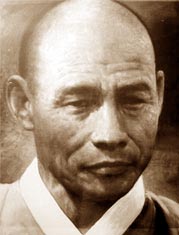Korean poet Han Yong-Un (pen name Manhae; 1879-1944) was a Buddhist monk who resisted against the Japanese occupation of Korea. He wrote about nationalism and love. I choose love, of course, and this famous ‘national’ poem. There is a creative English translation by ljlee (he also provides useful background information), which I like, but sounded too translated to my taste. Instead, here is a translation by a person called “owner” on allpoetry:
The silence of love
Love is gone, gone is my love.
Tearing himself away from me he has gone
on a little path that stretches in the splendor of
a green hill into the autumn-tinted forest.
Our last oath, shining and enduring
like a gold-mosaicked flower,
has turned to cold ashes, blown away
in the breath of wind.
I remember his poignant first kiss and its memory
has wrought a complete change in my destiny,
then withdrawn into oblivion.
I hear not his sweet voice; I see not his fair looks.
Since it is human to love, I, alert, dreaded a
parting to come when we met.
The separation came so suddenly
it broke my heart with renewed sorrow.
Yet, I know parting can only destroy our love if
it causes futile tears to fall.
I would rather transfer the surge of this sorrow
onto the summit of hopefulness.
As we dread parting when we meet, so,
we promise to meet again when we part.
Though my love is gone, I am not parted from love;
an untiring love-song envelops the silence of love.
The idea expressed in this poem seems straightforward: Lost love, sorrow, and then the refusal to give up hope, resulting in the emotional distinction between the love in itself and the beloved. The alternative translation had the title translated as ‘Silence of my beloved’; she rendered the crucial metaphor that turns sorrow into hope as follows: I took the overbearing force of my grief and poured it out into a wellspring of new hope.
Just for reasons of braggadocio, and because Korean looks so pretty and is fun to feed to Google Translate, here is the original poem:
님의 침묵(沈默)
한용운
님은 갔습니다. 아아, 사랑하는 나의 님은 갔습니다.
푸른 산빛을 깨치고 단풍나무 숲을 향하여 난 작은 길을 걸어서, 차마 떨치고 갔습니다.
황금(黃金)의 꽃같이 굳고 빛나든 옛 맹서(盟誓)는 차디찬 티끌이 되어서 한숨의 미풍(微風)에 날아갔습니다.
날카로운 첫 키스의 추억(追憶)은 나의 운명(運命)의 지침(指針)을 돌려 놓고, 뒷걸음쳐서 사라졌습니다.
나는 향기로운 님의 말소리에 귀먹고, 꽃다운 님의 얼굴에 눈멀었습니다.
사랑도 사람의 일이라, 만날 때에 미리 떠날 것을 염려하고 경계하지 아니한 것은 아니지만, 이별은 뜻밖의 일이 되고, 놀란 가슴은 새로운 슬픔에 터집니다.
그러나 이별을 쓸데없는 눈물의 원천(源泉)을 만들고 마는 것은 스스로 사랑을 깨치는 것인 줄 아는 까닭에, 걷잡을 수 없는 슬픔의 힘을 옮겨서 새 희망(希望)의 정수박이에 들어부었습니다.
우리는 만날 때에 떠날 것을 염려하는 것과 같이, 떠날 때에 다시 만날 것을 믿습니다.
아아, 님은 갔지마는 나는 님을 보내지 아니하였습니다.
제 곡조를 못 이기는 사랑의 노래는 님의 침묵(沈默)을 휩싸고 돕니다.
An example of the poem’s ambiguity, and the fantastic hold of his language demonstrated by its author, is the line about the summit of hopefulness. The original poem uses jeong-su, which can be either 精髓 essence, or pure water 淨水. A translator has to be creative here! I would probably talk about an infinite sadness that invigorates a new and purer hope and desire. Here is another interesting article I found on the topic of Korean poetry in translation.

One thought on “Reading: The silence of love by Han Yong-Un”
Comments are closed.